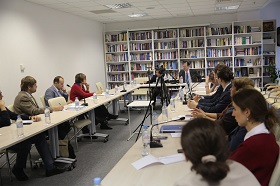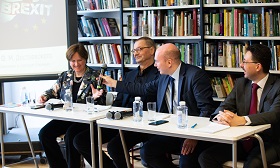During the 11th EUREN meeting in Moscow, the RIAC editorial team sat down with Dr Maxine David, Lecturer in European Studies at Leiden University and Research Fellow at the Global Europe Centre at the University of Kent. The discussion was focused on the uncertainty surrounding Brexit, how a new generation of voters could potentially tilt referendum polls and what UK experts are doing to ensure their research on the matter stays impartial.
During the 11th EUREN meeting in Moscow, the RIAC editorial team sat down with Dr Maxine David, Lecturer in European Studies at Leiden University and Research Fellow at the Global Europe Centre at the University of Kent. The discussion was focused on the uncertainty surrounding Brexit, how a new generation of voters could potentially tilt referendum polls and what UK experts are doing to ensure their research on the matter stays impartial.
Regarding the heated Brexit situation, please share your opinion on whether or not there is a way back and what potential outcome we could expect
The only thing clear right now is that we are still in a position where anything is possible. I avidly support remaining in the EU, as it is in the best interests of both the UK and the rest of our European partners. Nonetheless, the British public made a very clear decision. I suppose I am currently rather pessimistic, so I am inclined to believe that we will leave. We have a general election coming up soon, which is not the right tool to decide something as important as our future in the EU. A general election is about much more than just Brexit, even though Brexit impacts itself on so many other aspects of our political lives.
Our membership in the EU has showcased a dividing line in our country. The election could lead to a hung parliament again, which would put us in a position where we do not resolve anything and waste even more time. If the Labour party wins, we will probably have another referendum. Even though we are now speaking about a second referendum, this would be the third on the topic of EU membership. The very first referendum addressed our joining the then European Community, the second — whether we should leave the EU. The third referendum is about whether we should leave or remain.
No less important is that the Labour Party has shifted considerably under Corbyn, which makes its position on the matter somewhat unclear. If we end up with a hung parliament, I think we will turn to a referendum or a People’s Vote, as many of us call it. In that case, the polling is uncertain. We believe there to be much more of an appetite for remaining now than there was before. We also know that many more young people would be eligible to vote this time than there were before, and age was one of the dividing lines. Young people were more likely to vote remain; older people were more likely to vote leave. That was not the only difference, but it was an important one. I think it is foolish to guess what is going to happen.
So do you see a way back?
Yes. If there is another vote, then that becomes an option. The Liberal Democrats are campaigning on the idea that they will revoke Article 50 of the Lisbon Treaty. However, they are unlikely to get support or enough votes to become the governing party. Therefore I think that revocation is a dim possibility.
Could you please elaborate on Article 50?
The triggering of Article 50 signalled our intention to leave the EU. Now, while we are still in the transition period until the end of 2020, we still have the opportunity to revoke Article 50 at any time and remain in the Union. The EU does not have any say over that, so it would be our decision. After the transition period, things will become much more complicated, so the actual question is whether we would be inclined to take such measures. We also know that enlargement is a veto that any member state can win. Either we will leave, or we will have a People’s Vote, after which one cannot presume which way Brexit will go.
There is a clear message here. To truly assess the UK's membership in the EU, one needs significant specialist knowledge. The UK population was simply not equipped to make the decision they were being asked to. If we think about how much ignorance our politicians show and have shown over the last three years despite years of debate, it is becoming clear that people should never have been asked to make this decision. Nonetheless, a positive aspect of the situation is that we have acted as a cautionary tale to others about not leaving the EU. If another state were to do this, they would have to think very carefully on how they need to educate their people and correctly express the question being asked.
Speaking of difficult positions, it has also been very instructive for us as academics. We strive to be objective in our writings and classrooms. Not all of us believe that objectivity is possible, we carry baggage with us and depending on where you lean theoretically, you are more inclined to believe that objectivity is impossible than possible. While many experts that teach in the EU might be sceptical of the Union and advocate reform, most of them thought that the UK should remain. That was the best for the UK, both politically and economically. That is not to say that we wholeheartedly support the EU in its current form – most of us think that reform is necessary. Because of the very polarized media landscape in the UK, it became complicated for us as academics.
Experts holding public events or talking to the media got much criticism. Some were even saying that they were abusing their position, that they were entirely subjective or even propagandistic about things. It became particularly difficult for those who had received EU funding. So you would see the Daily Mail, for instance, talking about how the EU funded different academics and so, of course, they had to be pro-EU. They were viewed as if they were not critical thinkers or as if they could not make judgments for themselves. There is a saying in English, “to play the player and not the ball”. In this sense, the media and journalists were not engaging with the issue, but with the person that was speaking.
Why do you think Brexit initially gained support?
In order to understand why the British people voted the way they did, one has to remember decades of a mostly anti-EU and anti-European Community media reporting landscape. UK politicians would scapegoat the EU an awful lot. If one were to travel to Ireland, Spain or other parts of the EU as a tourist, one would see big signs saying “this road was built with EU structural funds”. You did not use to see this in the UK, even when EU funds were flowing back in and really helping the UK along the way. Westminster tended to take credit for things which were actually coming from Brussels, yet also blame Brussels for everything that did not go as planned. I think that people, the general public, can be understood if they did not see that tendency. This is also a part of the story.
Brexit has offered many learning opportunities for others, and it has been interesting to see some of the literature that came out of the situation. A significant amount of that literature is about emotions in politics because it became clear that, for many of us, this was an emotional decision.
Another significant issue is the situation of EU citizens living in the UK who, under freedom of movement, never had to apply for British citizenship. People have been living in the UK for years, they have children that were born there, and they have been paying their taxes and contributing to the economy. In essence, they have built lives. Having to now apply either for settled status or indefinite right to remain is very costly. Meanwhile, many of them feel like this is no longer the country that they moved to. The vital thing to note about Brexit is that it has shifted many of our perceptions about the country we live in, about what and who is valued.
Could you please comment on the role identity plays in the Brexit scenario?
Identity is a huge part of EU membership. On the one hand, I feel like I have to look to Brussels for support, people like Donald Tusk have been crucial for me to remain optimistic, as well as a few MPs of our own. Nonetheless, I believe the EU needs to consider the message it sends. If I identify as a European, I want to be able to count on Brussels to defend me as a citizen. Therefore, I would like to see more engagement in Brussels about what it means to be European and about what their role is in speaking up for EU citizens, regardless of their country of origin.
If the UK does leave the EU, then the UK could very well cease to be a “united” kingdom, which makes the reunification of Ireland more realistic. What was not considered was the momentum given to Scotland and its independence campaign. Then we have Gibraltar to consider as well, which is also problematic.
This makes it clear that we need constitutional reform. People are not voting with parties; they do not want to be represented by parties. The “first-past-the-post” system cannot work in a society where people cannot identify with political parties. So, in terms of constitutional reform, what I would like us to see is a return to the conversation about the need for a proportional voting system of some kind. Whether that will happen or not is a separate matter.
In short, I would say I am incredibly pessimistic. I think this is an act of self-harm, as well as harm to our European partners. I can imagine that if we do leave, we will pay the political and economic consequences for this for many years to come.







